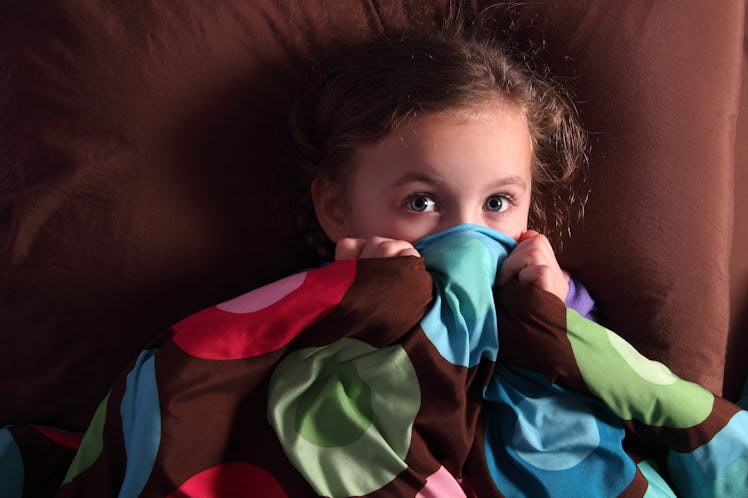5 Ways To Comfort Kids Who Have A Fear Of Ghosts
Everything a child is seeing or hearing is telling them that they’re in danger. The trick for parents, then, is to work with their child's mind rather than fight it.

Can kids see ghosts? It depends on who you ask, but what’s certain is that children with a phobia of ghosts can sense them everywhere — in creaking floors, shadows cast by trees, and in the odd aches of a home. For these children, ghosts are real, and therefore their fear of ghosts is real too. Kids seeing ghosts see them because, well, that’s what they think they see.
There’s a good reason for a child’s fear. It’s all in their minds. This’s not to say you can explain their fear away. You can’t. Developmentally, a young child gets frightened because everything they are seeing and hearing is telling them that they’re in real and present danger. The trick for parents, then, is in working with their child’s mind rather than fighting it.
Kids have the same fear triggers as adults, but they’re dialed up to 11, says Margee Kerr, Ph.D., a sociologist and author of Scream: Chilling Adventures in the Science of Fear. “Their imaginations can be really powerful and get the best of them,” she says. “They can’t make rational arguments yet, so that lack of ability to make sense of things can contribute to monster stories becoming really scary — because they can’t figure out what’s real.”
Fortunately, there are a few things you can do besides handing them a proton pack and wishing them good luck.
Stay On Topic During The Talk
Much like talking about where babies come from, talking about where ghosts come from can open up a whole containment unit of issues. “If your kid all of a sudden starts asking about ghosts and what happens when we die, stay consistent in whatever the child’s worldview is,” says Kerr. “If the family has never engaged in those religious ideas before, go more into imaginative play realm.”
That means you have two options: Tell them to go ask their Sunday school teacher, or just tell them that ghosts spend their lives in a weird realm where they can see but never taste ice cream, all because they didn’t listen to their parents.
Don’t Invalidate Their Fear Of Ghosts
The first thing you absolutely should not do when your kid starts freaking out about ghosts is tell them they’re not real. Invalidating their fears will get you nowhere. “The worst thing to tell a kid is ‘Don’t be scared,’” says Kerr. “You’re basically telling a kid that their experience is wrong, and that can lead to all kinds of pathology down the road.”
Let them believe in ghosts — like Santa or the Easter Bunny — until they reach the age when they call bullshit. “Or, they can decide they do believe in ghosts,” she says. If it’s the latter, they can always have a lucrative career on basic cable.
You Can’t Cheat (The Conversation About) Death
The topic will come up again and again — especially when there’s a death in the family — because this topic is as mysterious and terrifying for kids as it is for your middle-aged brain. The first step is to tailor the message to their age. Often parents sidestep the question by saying the deceased “went away” or “went to sleep for a while.” That can actually increase a kid’s anxiety because they’ll ask follow-up questions like, “When are they coming back?” or “What happens if I just never go to sleep?”
Younger kids may not understand the idea of permanence, so if you’re talking to a 3-year-old, try making the example concrete without talking about the great beyond. Like flowers — when they die they don’t need water or sunshine anymore, they just go back to the dirt. Same with grandma.
With older kids, they want to know what’s going to happen to you. “Most times when kids are asking about death, they want to understand that they’re going to be protected and safe, and that even if their parents die it doesn’t mean that they’re going to be alone,” says Kerr.
Help Kids Face Their Fears
“Don’t try to teach them that fear is avoidable. Acknowledge the fear and ask them questions about what they’re feeling and experiencing. That way they’ll learn that the way to move through something scary is to think and talk about it,” says Kerr.
“Having kids draw their monsters or ghosts has shown to be really helpful. You can even have them make a story around it, and guide that story to one that has a positive or playful ending.” Or you can just buy a book that has a happy ending.
This article was originally published on